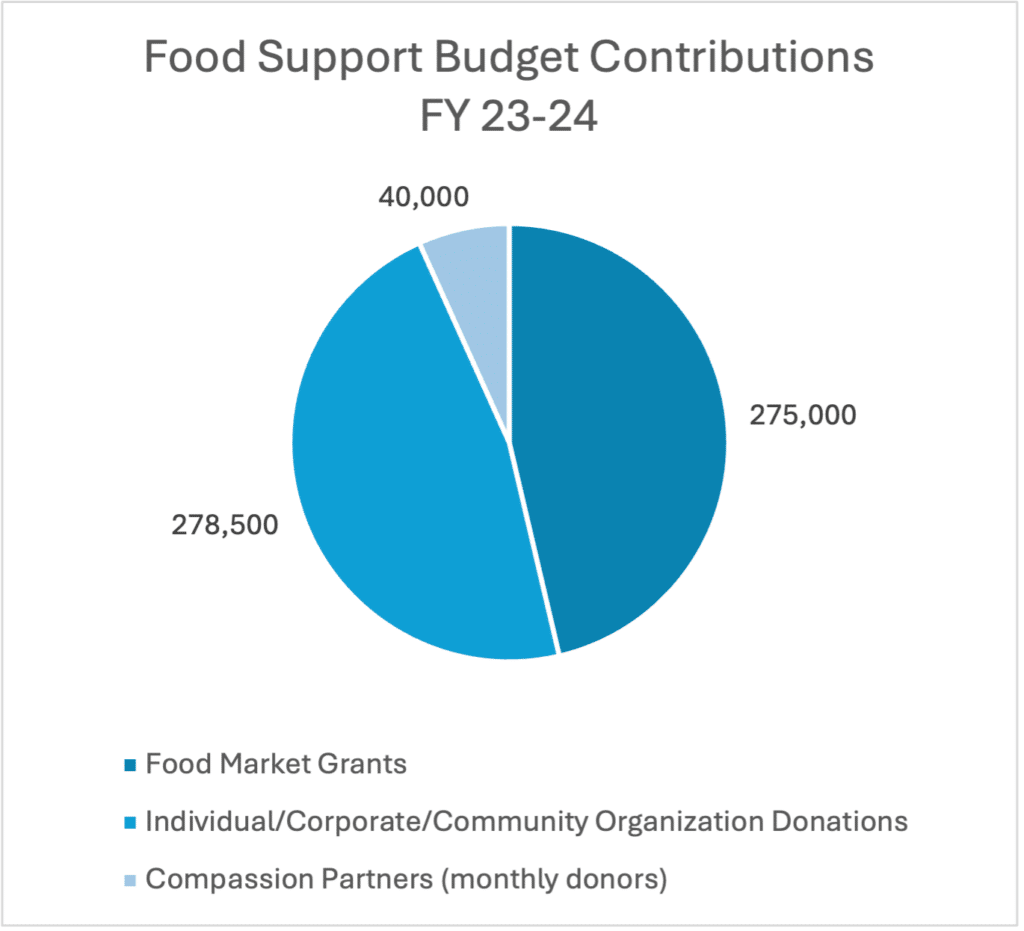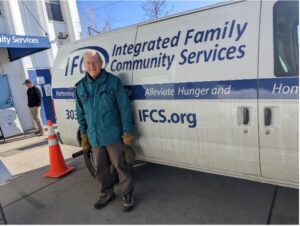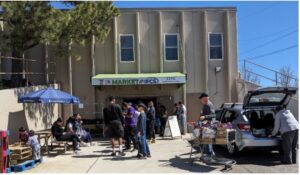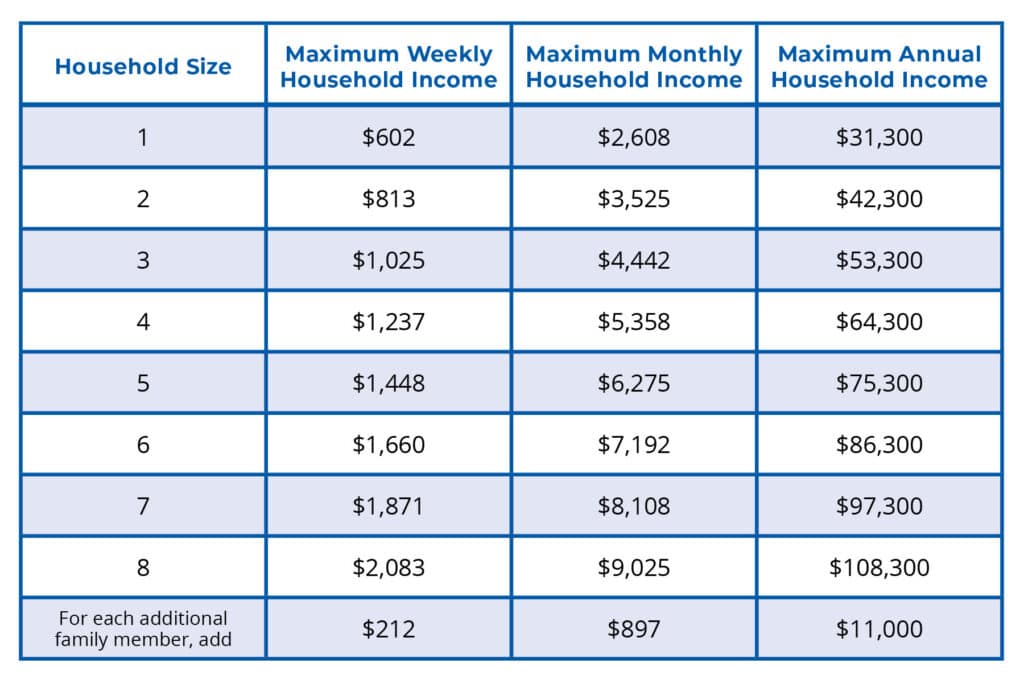When someone visits The Market at IFCS looking for food assistance, they can expect to be greeted by our friendly volunteers, potentially speak with a bilingual Resource Navigator, and by the end of their visit, leave with a bounty of nutritious ingredients—such as frozen meat, eggs and fresh produce—to feed their family with. But this journey of a meal from The Market to the table starts long before a family picks up their monthly allotment of food. It takes the coordination of our generous community of contributors for everything to come together each day at The Market.

The Budget: Grants
Let’s start with the finances. In any given year, IFCS requires $180,000 to $200,000 dollars each fiscal year to procure food for The Market. How do we get that money? The staff of IFCS spend countless hours writing grants and soliciting donor support.
Before the pandemic, 95% of IFCS food was procured through in-kind donations, and purchased 5% of food. Now, that script is flipped, with 95% of food being purchased. During the height of shutdowns and emergency government funding, IFCS achieved purchasing power that allowed us to provide a consistent box of nutritious food to families as often as they needed.
The past two years, that funding has waned, and in some cases became non-existent. Meanwhile, there is more competition between non-profits for limited grant funding sources. Everyone is feeling the strain, while we know the need for assistance is higher than ever.
For example, some grants we’ve received in the past were funded for 75% less than previous years. In the 2023-2024 fiscal year, our Executive Director collectively requested over $560,000 in food grants, and was funded for less than half of that amount.
Each month, IFCS aims to spend a minimum of $20,000 on food, which includes frozen meat, butter, yogurt, fresh produce, and shelf-stable pantry staples.
For one grant, IFCS was awarded $80,000, to spend across 12 months. 10%, or $8,000, of that grant can go toward administrative costs, such as the Food Market Manager’s salary. The other $72,000 must go toward food procurement, which is then divided by 12 months, bringing the budget to $6,000 a month for that particular grant. This leaves IFCS needing an additional $14,000 to feed the community on a once-a-month basis. This additional funding comes from additional grants and individual donations.
In any given year, IFCS will juggle up to eight grants, all of which have different rules (such as what percent can go toward administrative costs and what counties can be served with the money), and different timeframes the grant is active for.
At the beginning of every month, the accounting clerk reviews all active grants and determines the exact budget for the month. This budget then goes to the Food Market Manager and Program Director to determine what food is purchased and from where.
Procurement
By purchasing food, IFCS can secure food in bulk, all while stretching grant and donor dollars further than what’s available in grocery stores. IFCS has a variety of procurement sources to ensure our families are fed.
![]() Our biggest supplier is Food Bank of the Rockies (FBR).
Our biggest supplier is Food Bank of the Rockies (FBR).
- The Emergency Food Assistance Food (TEFAP): 40% of procured food comes from USDA, which in Denver, is distributed by FBR to food pantries like IFCS. This food comes to IFCS at no cost three times a month, and consists of frozen meat, fresh eggs, fresh fruit, and shelf-stable pantry staples. All of these foods combined help create a balanced diet for families.
- Purchased food: in addition to every TEFAP order, the market manager will purchase additional food in bulk to fill The Market shelves with items like oil, salt & pepper, pasta, tortillas, peanut butter and jelly, cereal, oats, etc.
- FRESH: this program at FBR provides a no-cost pallet of fresh produce to food pantries each week. IFCS relies on FRESH to provide families with a variety of seasonal produce, such as potatoes, carrots, pears, apples, and squash. Sometimes we’ll even receive melon and berries! Each week’s supply is different, so families can expect a rotating choice of produce each visit.
Colo-Pac Produce
In addition to FRESH, IFCS purchases highly desired produce from Colo-Pac Produce, which is delivered twice a week. This haul often consists of tomatoes, jalapenos, onions, and bananas.
IFCS will also purchase Colo-Pac for our seasonal enrichment programs, Ready, Set, School! and Helping Hands for the Holidays, which volunteers then assemble into bags for registered families.
Polidori Sausage and Tico’s Mexican Foods
IFCS has a long-standing relationship with Polidori Sausage and Tico’s Mexican Food. During the pandemic, IFCS utilized these relationships to procure additional meat for The Market.
Today, we purchase Polidori chorizo and breakfast sausage, as well as Tico’s taco meat to supplement the meat received from TEFAP and purchase through FBR. These two companies allow IFCS to stretch each dollar by offering bulk discounts. For example, from Polidori, we are able to purchase meat at $1.75 a pound, an unheard of price in the grocery store.
Sysco
Another item that sets IFCS apart from other pantries is the product we purchase from Sysco. Throughout the month, the Food Market Manager will order one pound blocks of butter, as well as yogurt cups.
Participants are always excited to hear we stock these products, and will comment they can’t find butter at other pantries.
Costco and Sam’s Club
These two companies allow IFCS to purchase supplemental food, ensuring we don’t run out of product at the end of a delivery cycle. If we’re running low on meat, we’ll purchase chicken from Costco. We’ll also order bulk supply of items like canned veggies, pasta, and canned beans when product from FBR is running low in The Market.
In-Kind Donations
While food donations have overall waned in favor of monetary donations, food drives, hygiene drives, and smaller one-off food donations still have a place at IFCS.
- One Can Feed Drive: There are always items that are difficult to procure through purchased sources. This is where food donations are needed. Recently, we created a One Can Feed Drive asking donors to organize drives focused on collecting large quantities of fewer items. The items requested? Shelf-stable products that are difficult to procure in large quantities, or are too expensive. This type of drive allows donors to add variety to The Market shelves.
- Garden Donations: In addition to shelf stable donations, IFCS welcomes local gardeners and local farmers to donate their extra produce during harvest season. This results in a beautiful variety of peppers, heirloom tomatoes, fresh herbs, radishes, and all varieties of squash to join our shelves.
- Hygiene Helper Drive: Items like soap, dental supplies, toilet paper, and feminine hygiene products are frequent asks by food recipients. Unfortunately, hygiene products are not covered by grant funding, and monetary donations are budgeted toward food support. This leaves IFCS reliant on donors to host hygiene drives to stock The Market with the items that will help families lead a clean and dignified life.
- No-Cook Meal Drive: IFCS serves more than just those who come through our doors. We also partner with organizations who serve unhoused communities, providing no-cook meals and snacks. While some of this food is purchased, we set aside donations that are easy to open (no can opener) and do not require cooking for these organizations to pick up once a month. We invite donors to consider collecting these items when hosting a drive.
Limitations on Purchasing and Solutions
While we enjoy the purchasing power that grants and donors provide, we still face limitations. For example, we pick up food from Food Bank of the Rockies three times a month, and each truck load is not allowed to exceed 10,000 lbs, per our truck rental agreement. This poses a challenge in ordering large enough quantities of each food item to last us until the next delivery.
As a solution, we will order additional smaller quantities of FBR food to be delivered to nearby food hub Food Exchange Resource Network (FERN) twice a month, and we order Costco and Sam’s Club to supplement. We also implemented an inventory system that will allow us to shift our purchasing focus to highly desired products.
Another challenge is the supply chain. Our suppliers are also facing challenges stocking shelves. One partner has been transparent about their significantly decreased budget as well as supply chain issues, resulting in lower quantities of food available for distribution. To look ahead, the Program Director is always searching for additional procurement sources that make sense for our operations.
Arriving at IFCS

After the long process of writing grants, waiting for approval, budgeting, and ordering, food is finally ready to arrive at IFCS.
For some products, the company will deliver food straight to our door. Others take some additional planning.

Once food is ordered from FBR, IFCS will reserve a 26’ Enterprise box truck, which a volunteer will pick up. If a volunteer is unavailable, we will ask our partners at Lifespan Local to help. The volunteer will then drive to FBR, located in Aurora, to pick up both our TEFAP and purchased food orders. The food is loaded by warehouse workers before the volunteer drives the 30 minutes back to IFCS in Englewood, where additional volunteers are ready with pallet jacks to help unload. The next hour is spent unpacking and stocking the frozen and refrigerated product.

At a later time, volunteers will stock the 6-8 pallets of shelf stable food, filling both Market and backstock shelves. Typically, students from Humanex Academy or Colorado Center for the Blind will help with this task. We also have some amazing volunteers on Thursday mornings who arrive early to stock any remaining food.
For smaller orders, FBR will deliver to local food hub, FERN, and a volunteer will take a cargo van to pick up and then unload by hand at IFCS.
IFCS to Table

Now that the food has finally made its way to IFCS, it is ready to be distributed to all who come through our doors needing assistance. Shelves are stocked, volunteers are ready, and families are lining up outside, ready for us to open.
Once checked in, families will be guided by a volunteer who lets them know how much of each item they can take based on their family size. As each family snakes their way through The Market, their cart will become loaded with frozen meat, eggs, shelf stable milk, pantry staples, and a bounty of fresh produce. There’s no check out process, and families leave our building smiling and ready to create lasting memories through the meals they create together.



